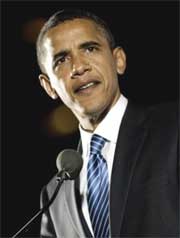Obama steps up campaign for rescue bill
09 Feb 2009
President Barak Obama is back at the campaign trail once again later in the day today, this time to whip up support for his $800-billion stimulus package.
 In an effort to build support for his economic plan, Obama will set off for Indiana on Monday. He will hold his first prime-time news conference on Monday night, and heading to Florida on Tuesday. In both states, he will be working to counter Republican criticism of his recovery package and take greater control of the debate.
In an effort to build support for his economic plan, Obama will set off for Indiana on Monday. He will hold his first prime-time news conference on Monday night, and heading to Florida on Tuesday. In both states, he will be working to counter Republican criticism of his recovery package and take greater control of the debate.
A number of private and public polls, as well as focus groups convened by Democratic strategists, have showed that the public's support for the economic recovery package is eroding as Republicans have intensified their criticism of the plan. So advisers to the president told him he had no choice but to fire up Air Force One and return to a mode of campaigning that helped him win the presidency.
Obama will address the nation for the first time in a prime-time appearance from the East Room of the White House and make his argument for why the economic bill is necessary. When he does, aides said, he will recount his visit earlier in the day to Elkhart, a city in Indiana, that has seen its unemployment rate rise to 15.3 per cent, largely because of layoffs in the recreational vehicle industry.
Obama is set to meet with the mayor, Dick Moore, who has assembled a list of 18 construction projects, from rebuilding runways at the local airport to upgrading sewer systems, which he said could help create 2,300 jobs.
To members of Congress who have yet to say how they intend to vote on the economic stimulus plan - including Senator Richard G. Lugar, Republican of Indiana - a bit of high-profile arm-twisting by the president will not go unnoticed on Capitol Hill, say commentators. The president is taking six members of Congress along on Monday, including one Republican, Representative Fred Upton of Michigan, whose vote the president is trying to win.
Elkhart, a city of 52,000 and south of the Michigan line, was alive with anticipation of the visit. A local newspaper reported on Sunday that a real estate developer had placed an advertisement to sell two tickets to see Obama for $1,000.
The developer, Nawab Manjee, said he intended to use the money to help him meet a week's worth of payroll - if anyone took him up on the offer.
Meanwhile, top aides of Obama are urging Democratic and Republican lawmakers to set aside political differences and quickly approve the stimulus package this week. "If there was ever a moment to transcend politics, this is that moment," Larry Summers, head of the White House national economic council, told 'Fox News ysterday.
Squabbling will resume on Monday when the Democratic-led Senate, with the help of just a few Republicans, votes to end debate on the rescue package and clear the way for its passage of the measure on Tuesday. Negotiators will then seek to resolve differences between the Senate bill and an $819-billion version of the measure earlier passed by the House of Representatives without any Republican support.
Obama has demanded that a final bill be on his desk by next Monday to sign into law. Seeking to keep Congress focussed on the package, the Obama administration on Sunday delayed treasury secretary Timothy Geithner's announcement of a keenly awaited and separate bank rescue plan until on Tuesday. The announcement had been expected to be made on Monday.
Democrats seem to have the votes needed to get the the economic stimulus package through. But Republicans ripped into Obama, charging he has fallen short of his campaign vow to work with them and promote a new spirit of cooperation in Washington.
"This agreement is not bipartisan," scoffed Republican Senator John McCain, who lost the 2008 White House race to Obama. Appearing on CBS's 'Face the Nation', McCain argued that the package is twice as much as needed. He also noted just three Republicans in the 100-member Senate back it.
McCain said he believed the rescue package "may help a bit," but will also saddle future generations with increased federal debt.

















